#the new woman
Text
Inge Schön by Trude Fleischmann
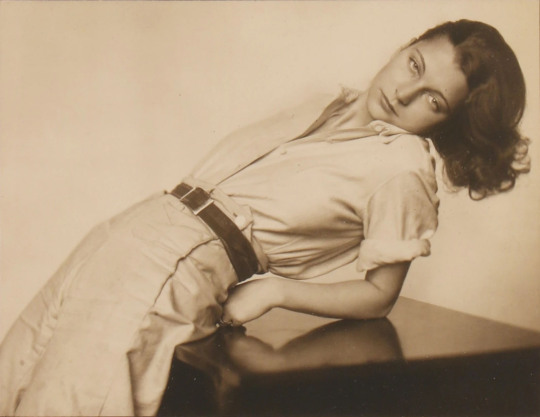
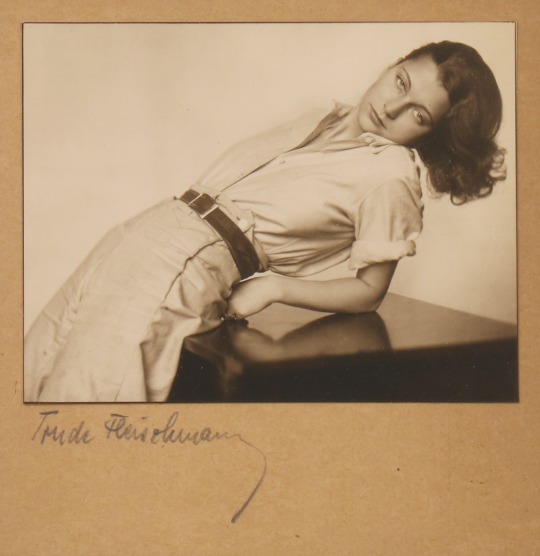
Trude Fleischmann (1895-1990) ~ Portrait of artist Inge Schön, ca. 1929, silver gelatin print, signed. | src Sworders
view more on wordPress
#Trude Fleischmann#Inge Schön#1920s#women artists#die neue frau#the new woman#portrait#Inge Schon#Inge Schoen#artist portrait#late 1920s#neue frau#Porträt#retrato#ritratto#portret#retrat#Bildnis#portraiture#1930s#women photographers
269 notes
·
View notes
Text
Mina mocking the New Woman like

#Mina I love you but you are sadly being written by a man who Does Not know what he's talking about#mina murray#mina harker#dracula#dracula daily#The New Woman
2K notes
·
View notes
Text

Anaïs Nin, The New Woman
#anais nin#the new woman#so true girl!#mine#studyblr#studyspo#dark academia#light academia#booklr#writing#chaotic academia#literature#classical academia
85 notes
·
View notes
Text
Mina's skepticism regarding The New Woman is so fascinating because they were a precursor to the Suffragette movement. Mina is expressing her concerns about how women's rights will affect what type of a life the future will bring. Like she refutes the idea of eating austerely and thinks the "New Woman" would disapprove. She thinks they are outlandish for wanting to propose to men instead of the otherway around. In general she's poking fun but she's being a little dismissive as well.
And honestly? In 2023 there are STILL women who doesn't understand what feminism is, and think its like a crazy fringe movement that will overturn the fabric of society. Its interesting that for all of Mina's positives, she struggles to understand how much she and the New Woman have in common.
#dracula (novel)#dracula daily#mina murray#mina harker#the new woman#victorian literature#victorian history#1890s#thebibi on vampirez#thebibi post
118 notes
·
View notes
Text
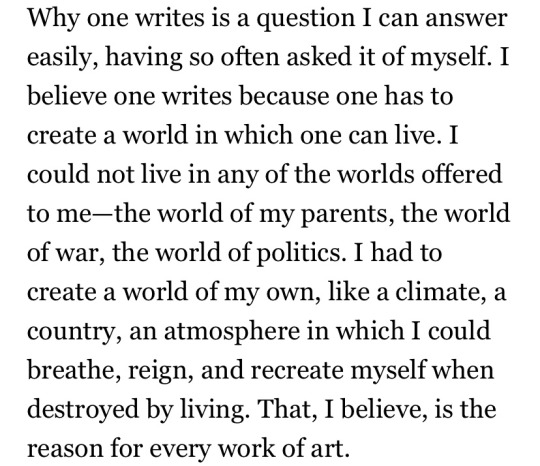
Anaïs Nin, from The New Woman
854 notes
·
View notes
Text
Jeanne Mammen, painter (1890-1976, Berlin)
She captured the modern 1920s life of Berlin and the new woman.

("Sie präsentiert", 1928)

(? Can't find title and date... )
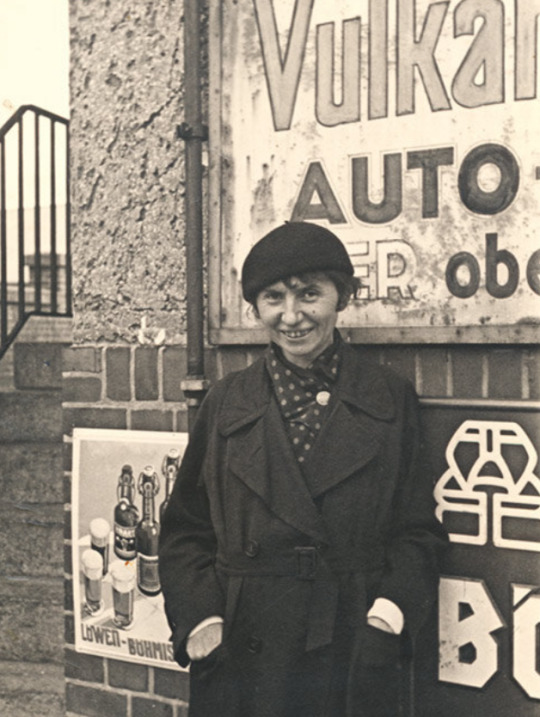
(portrait of the artist, source & date yet unknown to me...)
24 notes
·
View notes
Text
Dracula Daily, Prof. Thoughts, May 24
Hi all.
Sharing some more Dracula Daily thoughts here, as a literature prof with a PhD in 19th Century Lit. I really love all the Lucy chapters and I thought I'd give a few insights into women and what's going on Gender Wise in the book!
Basically: why is Lucy so sexy and what does it mean for sexy women in this story?
Spoilers for today's chapter beneath the cut.
So the big thing to remember about Dracula is that it's being written at the very end of the 19th Century, and very near the end of the Victorian era specifically (which ends in 1901--Drac comes out 1897). So you may have images of Victorians as stuffy Puritans, but by the 1890s, gradual improvements in access to education, literacy, and print ability have by now sunken their claws in and people are buzzing with ideas. The 1890s is an extremely exciting time for challenging tradition. Lots of new ideas are pouring in as Victorians take stock of the century, and one of the biggest is a giant cultural conversation over what women's roles in the world should be.
There's a giant push for a new feminist ideal, one that will eventually see women getting the vote, albeit not all at once. This push was for women to be capable participants in society beyond their roles as wives and mothers. Many people began to value women who were savvy, career-minded, independent, educated, and basically all-around badass bitches.
Victorians called this new type of woman The New Woman.
Basically, see photo below (Frances Benjamin Johnston's Self-Portrait (as "New Woman"), 1896).
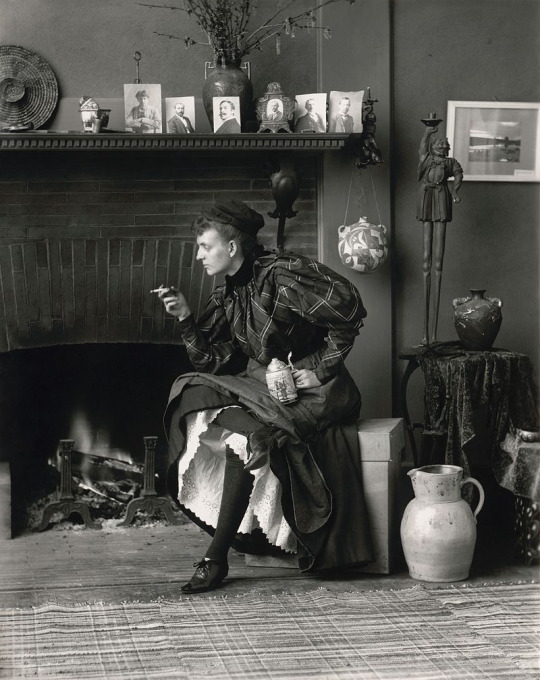
The thing about the New Woman was that people were excited for her--but there were also tons of anxieties about what this shift in traditional gender roles meant, not only for men but for institutions of marriage, child-rearing, and other things long considered the foundation of society.
We can see echoes of the New Woman in Mina and Lucy respectively.
Mina is savvy and has career skills. She can do stenography and use a typewriter (a new technology) and this is going to help her later in the book. In this way, Stoker has Mina embody what he clearly thinks are the coolest, best elements of the New Woman phenom. Mina is educated, smart, skilled and independent.
Lucy, meanwhile, doesn't have the career skills, but she has a kind of sensual dynamism that a lot of critics and readers love. She's overly romantic and flirts with having many lovers at once. She admits it's "heresy" but doesn't take it back as a sincere want, either. This polyamorous suggestion of wanting to have all three men at once is playful, but it also highlights the potential for passion that she tends to embody in the book.
Now, remember the Brides? Remember how they, too, were also overly sensual, with the word 'voluptuous' landing about 50 times, and Jonathan getting all lightheaded over their sensualized dominance, longing to be penetrated by their teeth in a reverse of traditional gender roles?
And these powerful, hyper-sexual women--our boy Bram depicts them as baby-eating monsters.
So, critics have long debated what Stoker is trying to say about the New Woman here. Obviously, he really likes the qualities he gives to Mina. And I think we can perhaps see a sliding scale between Lucy (innocent but romantically passionate) and the Brides (monstrously sexual) that shows he's also anxious over, shall we say, sexually enthusiastic women.
But unlike the Brides, Lucy is so much fun, and is clearly depicted as charming and loveable. Lucy, unlike the Brides, is not depicted as a monster, but an enthusiastic would-be bride* (three times over).
But her enthusiasm for love, romance, and (by coded suggestion) sensual experience with these men is the result of a more empowered kind of woman more prevalent in the 19th Century. And maybe it's most nuanced to say that Stoker's got mixed feelings about that figure.
So: Mina gets the good parts of the New Woman (according to Stoker), like independence and career savvy. And Lucy gets the alluring but potentially troubling or subversive parts (according to Stoker), such as free-spirited attitude towards love, sex and the powers inherent in those things.
Where does this go?? We'll have to keep reading.
**Important to note that Dracula's roommates are never called Brides in the text, so any parallel here between Lucy-as-Bride and Brides-of-Dracula is incidental; I just like calling them the Brides instead of Dracula's Roommates.
#dracula daily#19th century#Victorian era#dracula spoilers#dracula#lucy westenra#mina murray#the new woman#bram stoker
142 notes
·
View notes
Photo

1924 George Barbier, La Terre (The Earth)
Hand-coloured, plate-signed pochoir from Falbalas & Fanfreluches: "The Earth" is part of Barbier's 1924 "Four Elements" quatrain. This bucolic scene is the "earthy" depiction of the New Woman, who in the 20's has taken on the former male-only domains of the cigarette, the ballot, and symbolically here, the "can-do" spade as well. Barbier's works frequently contain juxtaposed undertones of the revolutionary social (feminist) upheavals taking place right alongside the fabulous fresh treatments in fashion and fabric. This is the Center of the New Universe, as shown by the marked curvature of the grassy earth-plane.
This famous illustrated almanac series was produced from 1922 to 1926 only and depicted high-society life in Paris - the fashion, social and artistic capital of the early inter-war years. Each issue contained a small diary and notation section, an introduction by one of the leading social/cultural doyens of the day, a decorative cover and twelve fashion plates (one for each month of the year), hand-coloured via stencil and watercolour/gouache.
For sale: Artophile.com
#1924#illustration#art deco#barbier#george barbier#la terre#the earth#the new woman#can-do#high-society#high society in paris#pochoir#four elements#20s lifestyle#20s illustration#20s paris#1924 illustration
10 notes
·
View notes
Text
“Baudelaire told me a long time ago that in each one of us there is a man, a woman, and a child—and the child is always in trouble.”
— Anaïs Nin, The New Woman
1 note
·
View note
Text
so one of the things that's so horrifying about birth control is that you have to, like, navigate this incredibly personal choice about your body and yet also face the epitome of misogyny. like, someone in the comments will say it wasn't that bad for me, and you'll be utterly silenced. like, everyone treats birth control like something that's super dirty. like, you have no fucking information or control over this thing because certain powerful people find it icky.
first it was the oral contraceptives. you went on those young, mostly for reasons unrelated to birth control - even your dermatologist suggested them to control your acne. the list of side effects was longer than your arm, and you just stared at it, horrified.
it made you so mentally ill, but you just heard that this was adulthood. that, yes, there are of course side effects, what did you expect. one day you looked up yasmin makes me depressed because surely this was far too intense, and you discovered that over 12,000 lawsuits had been successfully filed against the brand. it remains commonly prescribed on the open market. you switched brands a few times before oral contraceptives stopped being in any way effective. your doctor just, like, shrugged and said you could try a different brand again.
and the thing is that you're a feminist. you know from your own experience that birth control can be lifesaving, and that even when used for birth control - it is necessary healthcare. you have seen it save so many people from such bad situations, yourself included. it is critical that any person has access to birth control, and you would never suggest that we just get rid of all of it.
you were a little skeeved out by the implant (heard too many bad stories about it) and figured - okay, iud. it was some of the worst pain you've ever fucking experienced, and you did it with a small number of tylenol in your system (3), like you were getting your bikini line waxed instead of something practically sewn into your body.
and what's wild is that because sometimes it isn't a painful insertion process, it is vanishingly rare to find a doctor that will actually numb the area. while your doctor was talking to you about which brand to choose, you were thinking about the other ways you've been injured in your life. you thought about how you had a suspicious mole frozen off - something so small and easy - and how they'd numbed a huge area. you thought about when you broke your wrist and didn't actually notice, because you'd thought it was a sprain.
your understanding of pain is that how the human body responds to injury doesn't always relate to the actual pain tolerance of the person - it's more about how lucky that person is physically. maybe they broke it in a perfect way. maybe they happened to get hurt in a place without a lot of nerve endings. some people can handle a broken femur but crumble under a sore tooth. there's no true way to predict how "much" something actually hurts.
in no other situation would it be appropriate for doctors to ignore pain. just because someone can break their wrist and not feel it doesn't mean no one should receive pain meds for a broken wrist. it just means that particular person was lucky about it. it should not define treatment.
in the comments of videos about IUDs, literally thousands of people report agony. blinding, nauseating, soul-crushing agony. they say things like i had 2 kids and this was the worst thing i ever experienced or i literally have a tattoo on my ribs and it felt like a tickle. this thing almost killed me or would rather run into traffic than ever feel that again.
so it's either true that every single person who reports severe pain is exaggerating. or it's true that it's far more likely you will experience pain, rather than "just a pinch." and yet - there's nothing fucking been done about it. it kind of feels like a shrug is layered on top of everything - since technically it's elective, isn't it kind of your fault for agreeing to select it? stop being fearmongering. stop being defensive.
you fucking needed yours. you are almost weirdly protective of it. yours was so important for your physical and mental health. it helped you off hormonal birth control and even started helping some of your symptoms. it still fucking hurt for no fucking reason.
once while recovering from surgery, they offered you like 15 days of vicodin. you only took 2 of them. you've been offered oxy for tonsillitis. you turned down opioids while recovering from your wisdom tooth extraction. everything else has the option. you fucking drove yourself home after it, shocked and quietly weeping, feeling like something very bad had just happened. the nurse that held your hand during the experience looked down at you, tears in her eyes, and said - i know. this is cruelty in action.
and it's fucked up because the conversation is never just "hey, so the way we are doing this is fucking barbaric and doctors should be required to offer serious pain meds" - it's usually something around the lines of "well, it didn't kill you, did it?"
you just found out that removing that little bitch will hurt just as bad. a little pinch like how oral contraceptives have "some" serious symptoms. like your life and pain are expendable or not really important. like maybe we are all hysterical about it?
hysteria comes from the latin word for uterus, which is great!
you stand here at a crossroads. like - this thing is so important. did they really have to make it so fucking dangerous. and why is it that if you make a complaint, you're told - i didn't even want you to have this in the first place. we're told be careful what you wish for. we're told that it's our fault for wanting something so illict; we could simply choose not to need medication. that maybe if we don't like the scraps, we should get ready to starve.
we have been saying for so long - "i'm not asking you to remove the option, i'm asking you to reconsider the risk." this entire time we hear: well, this is what you wanted, isn't it?
#where's the word woman in this u might wonder if u suck#good news i am nonbinary and have a uterus so that is something that can happen#im also gender fluid tho which means im immune to certain psychic damage bc if u call me a woman i'll be like <3 okay <3#writeblr#the tightrope of ''ppl need access to this''#and like also#''what the fuck is going on over there'' is like. so difficult as an activist#i was <3 punctured <3 during mine#and almost bled out on the table :) they didn't have anyone standing by bc it's ''just a little insertion''#so i started crashing and i vaguely remember apologizing for the fuss as i heard my heart rate monitor start going <3 tachycardic <3#she wasn't even a bad doctor tbh#ps btw the reason i even HAD a heart monitor is that i have a genuine heart condition and they knew GOING IN that there was a chance#i'd crash on the table#like my heart just likes to do fun little tricks and <3 stop working <3 (i do not want to discuss the specifics ty i am okay im ontop of it#and they were like 'oh u will be fine' and then she did do a puncture thru my uterus . pop!#and im sitting there dizzy and feeling my heartrate start to drop bc it feels almost. beautiful. like. the whole ground just#woosh! out from under you. and shit is like grey's anatomy. i'm looking up at her grey eyes#she's old she wears this nice shawl she's like got Cool Lesbian vibes and people are sprinting into the room#from other parts of the clinic unrelated to me. while the monitor is like a little aria singing#and shes like hey youre okay stay awake stay with me something went wrong we have to keep trying#and i remember thinking - i was trying to think of nice things. i have so many beautiful places that now overlap#with this terrible memory#i became dimly aware that there was too much on her wrists and hands. like#that was too many liters#and then when they had finished all this. i packed up and drove myself home#i have had (bad thing) happen to me. and the same feeling happened after#that numb almost lamblike bleating. you cry without noise. like. ur body is so shocked and ur mind so empty#you just stare at the road and everything everything is happening behind glass and static and you are standing so far away from it#while you hold ur hands at 10 and 2. and something in ur brain is SCREAMING at you - IT WAS BAD AND IT SHOULDNT HAVE HAPPENED#and ur just watching the alarms in your body going off and youre thinking. a little pinch! ha. i think i just lost something important.
9K notes
·
View notes
Text
Otto Dix · Sylvia von Harden
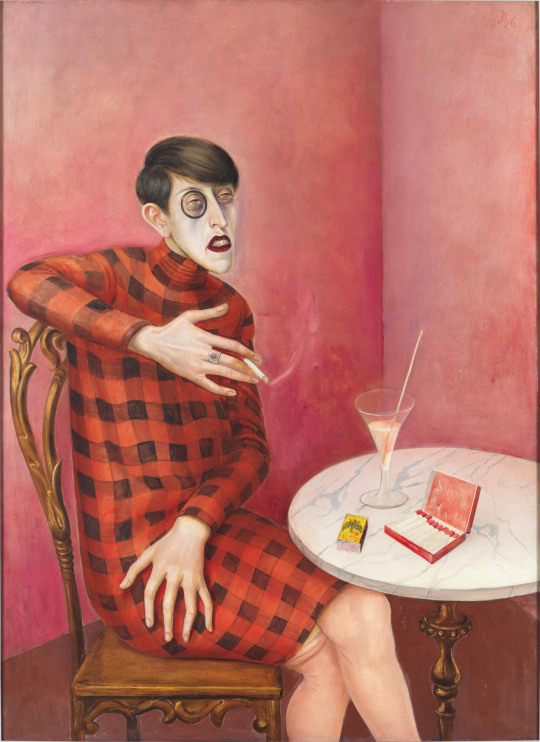
Otto Dix (1891-1969) ~ Bildnis der Journalistin Sylvia von Harden, 1926. Oil and tempera on wood | src Centre Pompidou
view & read more on wordPress

[Note the inscription of her aristocratic name "Sylvia von Harden" on the inner cover of the cigarette box]
Journaliste à Berlin dans les années 1920, Sylvia von Harden (1894-1963) s’affiche en intellectuelle émancipée par une pose nonchalante. Otto Dix contrarie son arrogance par le détail d’un bas défait. Sa robe-sac à gros carreaux rouges détonne avec l’environnement rose, typique…
view & read more on wordPress
#Otto Dix#androgynous#Sylvia von Harden#August Sander#die neue frau#weimar republic#Journalistin#monocle#neue frau#Neue Sachlichkeit#portrait#new objectivity#new woman#tempera on wood#oil on wood#painting#Porträt#retrato#ritratto#portret#1920s#retrat#Bildnis#Sylvia von Halle#tempera painting#gemalde#the new woman#Weimar#weimar era#weimar republic art
74 notes
·
View notes
Text
Dracula Dailiers we have a LOT to unpack
-RIP to the Captain, Whitby loves and misses you
-Surprise RIP to Mr. Swales, I know you died shit-talking the Count so mercilessly the ancient bastard had to snap your neck*
-*Alternatively, it was because you were sitting over the grave he wanted to use for his camp-out resting place. Hence why yet another dog got its hackles up when passing near the spot, having sensed the atrocious Dracula-vibes within. Also, shout-out to the asshole dog owner who kicked his own pup, I hope you get gangrene in that foot.
-Lucy is still sleepwalking. We can be pretty sure there’s some extra influence going on there. But what gets all my hairs standing up is that Mina knows Something More is up and Lucy refuses to talk about it. Worse, it’s something that implies a miserable camaraderie with the dog’s terror when touching the gravestone; the inarticulate dread, the fear that comes with Knowing There is a Threat and Not Knowing the Threat’s Name.
-Good cows!
-Hoo boy, here comes Stoker’s misplaced mouthpiece time with Mina poo-pooing ‘the New Woman.’ Between this sniffing at the independent stance of the New Woman phenomenon and the Lilith-adjacent baby-eating caricature the sexy evil Brides present, Stoker was hitting the gas on the lady prejudice. Ironically, in a way that flies in the face of his main girl being so obviously in line with a lot of the New Woman’s principles. Yes, as the book goes on, there will be some period-typical maidenly fretting and ‘do not fear, this is man’s work!’ moments—which kind of tips Stoker’s hand in a very telling ‘appreciation’ for manful men doing manful men things. With other men.—but when Mina isn’t performing damsel duty?
She’s a worker. She’s a thinker. She’s a doer. She fills 90% of traditional male roles in literature throughout the story just as Jonathan filled out the gothic damsel in distress role at the book’s start. Frankly I think the only reason she or Lucy are able to unironically turn their noses up at the ‘New Woman’ is because:
A) They’re miraculously surrounded by the most chivalrous men on Earth, let alone in England. They’ve no reason to get ruffled over a lack of respect or care.
B) Mina’s only solid acquaintance with men beyond a few interviewees so far is Jonathan ‘Mina-Addicted Sweetheart’ Harker and Mr. Hawkins who’s like a second father.
C) Her social circle really isn’t all that big, period. Yes, there’s Lucy who she’s known since childhood, Jonathan, her students, but who else does she really talk about like they’re close? Least of all any acquaintances who might be or know ~confirmed~ New Women?
D) Being a newspaper lover, I’d bet money her only real ‘knowledge’ of the New Woman phenomenon comes from Punch comics and mansplained satire discussing outlandish parodies of the actual movement/women. Of course she isn’t like them! How absurd!
E) She does genuinely want to start a family with Jonathan and this traditional desire likely feels to her like another proof against her being a dreadful (gasp) New Woman.
All the while she’s oblivious to all the traits that make her—the working, intelligent, active, teacher/budding journalist/equal partner to her fiancé—very much part of the New Woman movement. It wouldn’t surprise me if Jonathan was someday stunned to realize she was in earnest about her disdain, leading to him gently, lovingly, claiming he is quite shocked and hurt, as one of his best friends is a New Woman. Would he like to meet her?
Cue him holding up a mirror.
-Lucy is so pretty and full of blood <3
-I too would be happier if only I knew if Jonathan. Where Jonathan. Want Jonathan. Return Jonathan.
#in which there is rambling#dracula#dracula daily#mina murray#mina harker#lucy westenra#jonathan harker#The New Woman#bram stoker
1K notes
·
View notes
Text
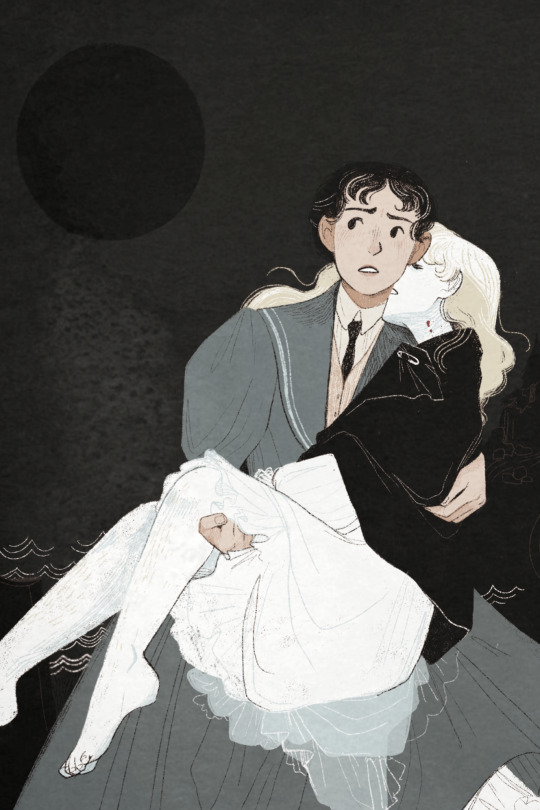
"For a moment or two I could see nothing, as the shadow of a cloud obscured St. Mary’s Church and all around it. Then as the cloud passed I could see the ruins of the abbey coming into view; and as the edge of a narrow band of light as sharp as a sword-cut moved along, the church and the churchyard became gradually visible. Whatever my expectation was, it was not disappointed, for there, on our favourite seat, the silver light of the moon struck a half-reclining figure, snowy white."
Mina and Lucy in the kirkyard at Whitby, August 11th.
#my art#dracula#mina murray#mina harker#lucy westenra#digital art#i realized as i was finishing this up that they look very much like how i draw donna and laura but yknow what?#thats not a bad thing! a lot of parallels! a lot of themes! a lot of trying to save the best friend you are incapable of saving#once again I spent too long looking at old clothing catalogues bc i love the little references mina and lucy make to idea of the new woman#and they def talk about it like an Other but also w a bit of awe and im sure theres a lot to unpack there#but it made me wanna put mina in something new-woman-adjacent#lets get her a little bit leyendecker yknow?
6K notes
·
View notes
Note
I didn't read her as being dismissive, actually. She sounded curious.
I think its interesting how Mina's remarks still touch a nerve 126 years later….I do think multiple interpretations are totally acceptable. I just personally see them as kind of snide remarks. I don't think she'd scoff at anyone calling themselves a New Woman, and I think if confronted she would probably think they're ok.
Like when Mina says, "I believe we should have shocked the "New Woman" with our appetites. Men are more tolerant, bless them!" in regards to her afternoon tea, she's joking about how the New Women were encouraging to eat more austerely (clean eating). But Mina has a large meal instead, which is neither appropriate Victorian behavior (women should eat dainty meals) nor New Woman behavior (food is fuel and not a performance). Its kind of a "I'm not like other girls" statement. The line about men being "more tolerant" is probably assuming men eat more than women.
And then later on when Mina watches Lucy sleep and she says "But I suppose the New Woman won't condescend in future to accept; she will do the proposing herself. And a nice job she will make of it, too! There's some consolation in that." She's imagining an outlandish scenario and going "oh well, at least it'll be pretty". The world "consolation" has a negative meaning that its not what you wanted but what you'll accept.
Maybe its because she's writing after an extraordinary long day and is tired, but to me they come across as annoyed or irritated rather than curious. There are moments later in the book where Mina's curiosity is described in how excited she acts, and she can't hide how she truly feels about it.
#dracula daily#mina murray#mina harker#the new woman#dracula (novel)#idk if this makes sense#thebibi answers#thebibi on vampirez
31 notes
·
View notes
Text
The new woman #6: Annemarie Schwarzenbach (1908-1942, Writer, Journalist, Photographer)
She lived in and traveled through Europe, the middle east, Africa and the U.S.
“She was neither a man nor a woman, but an angel, an archangel.” — Marianne Breslauer


(pictures by Marianne Breslauer)
28 notes
·
View notes
Text
The Forgotten History of the World’s First Transgender Clinic
I finished the first round of edits on my nonfiction history of trans rights today. It will publish with Norton in 2025, but I decided, because I feel so much of my community is here, to provide a bit of the introduction.
[begin sample]
The Institute for Sexual Sciences had offered safe haven to homosexuals and those we today consider transgender for nearly two decades. It had been built on scientific and humanitarian principles established at the end of the 19th century and which blossomed into the sexology of the early 20th. Founded by Magnus Hirschfeld, a Jewish homosexual, the Institute supported tolerance, feminism, diversity, and science. As a result, it became a chief target for Nazi destruction: “It is our pride,” they declared, to strike a blow against the Institute. As for Magnus Hirschfeld, Hitler would label him the “most dangerous Jew in Germany.”6 It was his face Hitler put on his antisemitic propaganda; his likeness that became a target; his bust committed to the flames on the Opernplatz. You have seen the images. You have watched the towering inferno that roared into the night. The burning of Hirschfeld’s library has been immortalized on film reels and in photographs, representative of the Nazi imperative, symbolic of all they would destroy. Yet few remember what they were burning—or why.
Magnus Hirschfeld had built his Institute on powerful ideas, yet in their infancy: that sex and gender characteristics existed upon a vast spectrum, that people could be born this way, and that, as with any other
diversity of nature, these identities should be accepted. He would call them Intermediaries.
Intermediaries carried no stigma and no shame; these sexual and Gender nonconformists had a right to live, a right to thrive. They also had a right to joy. Science would lead the way, but this history unfolds as an interwar thriller—patients and physicians risking their lives to be seen and heard even as Hitler began his rise to power. Many weren’t famous; their lives haven’t been celebrated in fiction or film. Born into a late-nineteenth-century world steeped in the “deep anxieties of men about the shifting work, social roles, and power of men over women,” they came into her own just as sexual science entered the crosshairs of prejudice and hate. The Institute’s own community faced abuse, blackmail, and political machinations; they responded with secret publishing campaigns, leaflet drops, pro-homosexual propaganda, and alignments with rebel factions of Berlin’s literati. They also developed groundbreaking gender affirmation surgeries and the first hormone cocktail for supportive gender therapy.
Nothing like the Institute for Sexual Sciences had ever existed before it opened its doors—and despite a hundred years of progress, there has been nothing like it since. Retrieving this tale has been an exercise in pursuing history at its edges and fringes, in ephemera and letters, in medal texts, in translations. Understanding why it became such a target for hatred tells us everything about our present moment, about a world that has not made peace with difference, that still refuses the light of scientific evidence most especially as it concerns sexual and reproductive rights.
[end sample]
I wanted to add a note here: so many people have come together to make this possible. Like Ralf Dose of the Magnus-Hirschfeld-Gesellschaft (Magnus Hirschfeld Archive), Berlin, and Erin Reed, American journalist and transgender rights activist—Katie Sutton, Heike Bauer. I am also deeply indebted to historian, filmmaker and formative theorist Susan Stryker for
her feedback, scholarship, and encouragement all along the way. And Laura Helmuth, editor of Scientific American, whose enthusiasm for a short article helped bring the book into being. So many LGBTQ+ historians, archivists, librarians, and activists made the work possible, that its publication testifies to the power of the queer community and its dedication to preserving and celebrating history. But I ALSO want to mention you, folks here on tumblr who have watched and encouraged and supported over the 18 months it took to write it (among other books and projects). @neil-gaiman has been especially wonderful, and @always-coffee too: thank you.
The support of this community has been important as I’ve faced backlash in other quarters. Thank you, all.
NOTE: they are attempting to rebuild the lost library, and you can help: https://magnus-hirschfeld.de/archivzentrum/archive-center/
#support trans rights#trans history#trans#transgender#trans woman#trans rights#trans representation#interwar period#weimar#equality#autistic author#nonbinary#lgbtq representation#lgbtqia#book news#book#books#new books#thank you#neil gaiman#for your support
2K notes
·
View notes